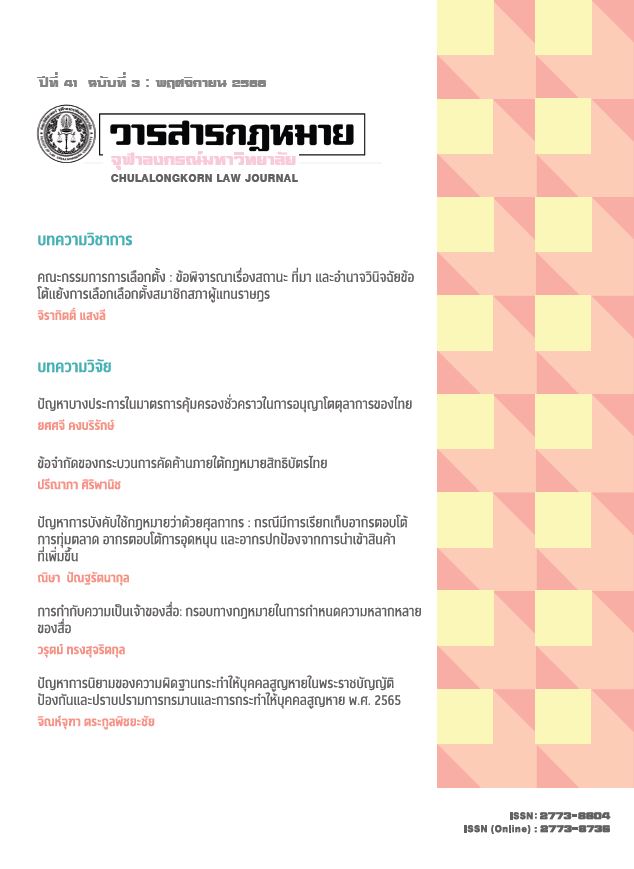ปัญหาการบังคับใช้กฎหมายว่าด้วยศุลกากร : กรณีมีการเรียกเก็บอากรตอบโต้การทุ่มตลาด อากรตอบโต้การอุดหนุน และอากรปกป้องจากการนำเข้าสินค้าที่เพิ่มขึ้น
Main Article Content
บทคัดย่อ
การเรียกเก็บอากรตอบโต้การทุ่มตลาด อากรตอบโต้การอุดหนุน และอากรปกป้องจากการนำเข้าสินค้าที่เพิ่มขึ้น มีปัญหาการนำกฎหมายว่าด้วยศุลกากรมาใช้บังคับกับการเรียกเก็บอากรดังกล่าว ทั้งในเรื่องความรับผิดในการชำระอากรกรณีที่มีการใช้สิทธิประโยชน์ทางภาษีศุลกากร การกำหนดเบี้ยปรับและเงินเพิ่ม การคืนอากร การอุทธรณ์การประเมินอากร การนำบทกำหนดความผิดและบทกำหนดโทษตามกฎหมาย
ว่าด้วยศุลกากรมาใช้บังคับ และการเรียกเก็บอากรสำหรับเศษหรือของที่ด้อยคุณภาพ ซึ่งเป็นปัญหาการบังคับใช้กฎหมายระหว่างหน่วยงานที่เกี่ยวข้อง บทความนี้จึงมุ่งศึกษาแนวความคิดและเจตนารมณ์ในการเรียกเก็บอากรตอบโต้การทุ่มตลาด อากรตอบโต้การอุดหนุน และอากรปกป้องจากกการนำเข้าสินค้าที่เพิ่มขึ้นและนำเสนอข้อพิจารณาเกี่ยวกับปัญหาการบังคับใช้กฎหมายว่าด้วยศุลกากร ภายใต้พระราชบัญญัติการตอบโต้การทุ่มตลาดและการอุดหนุนซึ่งสินค้าจากต่างประเทศ พ.ศ. 2542 และพระราชบัญญัติมาตรการปกป้องจากการนำเข้าสินค้าที่เพิ่มขึ้น พ.ศ. 2550 โดยมีข้อเสนอแนะให้หน่วยงานที่เกี่ยวข้องกำหนดแนวทางปฏิบัติร่วมกัน โดยพิจารณาถึงเจตนารมณ์แห่งกฎหมายเป็นสำคัญ เพื่อให้การบังคับใช้กฎหมายเป็นไปอย่างมีประสิทธิภาพมากยิ่งขึ้น และแก้ไขบทบัญญัติในส่วนที่เกี่ยวกับการดำเนินการของกรมศุลกากรในการเรียกเก็บอากรตอบโต้การทุ่มตลาด อากรตอบโต้การอุดหนุน และอากรปกป้องจากการนำเข้าสินค้าที่เพิ่มขึ้น ให้สอดคล้องและเป็นมาตรฐานเดียวกัน
Article Details

อนุญาตภายใต้เงื่อนไข Creative Commons Attribution-NonCommercial-NoDerivatives 4.0 International License.
ลิขสิทธิ์และเนื้อหาในเว็บไซต์ของวารสารกฎหมาย (รวมถึง โดยไม่จำกัดเฉพาะ เนื้อหา รหัสคอมพิวเตอร์ งานศิลป์ ภาพถ่าย รูปภาพ ดนตรีกรรม โสตทัศนวัสดุ) เป็นกรรมสิทธิ์ของวารสารกฎหมาย และผู้ได้รับการโอนสิทธิทุกราย
1. วารสารกฎหมาย ให้อนุญาตให้คุณใช้สิทธิอันไม่เฉพาะเจาะจงที่สามารถถูกถอนเมื่อใดก็ได้ โดยไม่มีค่าใช้จ่าย ในการ
- เยี่ยมชมเว็บไซต์และเอกสารในเว็บไซต์นี้ จากคอมพิวเตอร์หรือเครื่องมือสื่อสารผ่านเว็บบราวเซอร์
- คัดลอกและจัดเก็บเว็บไซต์และเอกสารในเว็บไซต์นี้บนลงคอมพิวเตอร์ของคุณผ่านระบบความจำ cache
- สั่งพิมพ์เอกสารจากเว็บไซต์นี้สำหรับการใช้ส่วนตัวของคุณ
- ผลงานที่ได้รับการตีพิมพ์โดยวารสารกฎหมาย จุฬาลงกรณ์มหาวิทยาลัย ถูกคุ้มครองภายใต้ Creative Commons Attribution 4.0 International License ซึ่งอนุญาตให้ทุกคนสามารถคัดลอก แจกจ่าย ดัดแปลง ส่งต่อ ผลงานได้ ก็ต่อเมื่อผลงานและแหล่งข้อมูลได้รับการอ้างอิงอย่างเหมาะสม
2. วารสารกฎหมาย จุฬาลงกรณ์มหาวิทยาลัย สงวนสิทธิ์ไม่อนุญาตให้คุณใช้สิทธิอื่นใดที่เกี่ยวข้องกับเว็บไซต์และเอกสารบนเว็บไซต์นี้ เช่น การคัดลอก ดัดแปลง เปลี่ยนแปลง ส่งต่อ ตีพิมพ์ แจกจ่าย เผยแพร่ จัดแสดงในที่สาธารณะ ไม่ว่าจะในรูปแบบใดก็ตาม ซึ่งเว็บไซต์หรือเอกสารบนเว็บไซต์ โดยไม่อ้างอิงถึงแหล่งข้อมูลหรือโดยไม่ได้รับอนุญาตเป็นลายลักษณ์อักษรจากวารสารกฎหมาย จุฬาลงกรณ์มหาวิทยาลัย
3. คุณอาจขออนุญาตที่จะใช้เอกสารอันมีลิขสิทธิ์บนเว็บไซต์นี้โดยการเขียนอีเมลล์มายัง journal@law.chula.ac.th
4. วารสารกฎหมาย จุฬาลงกรณ์มหาวิทยาลัย เข้มงวดกับการคุ้มครองลิขสิทธิ์อย่างมาก หากวารสารกฎหมาย จุฬาลงกรณ์มหาวิทยาลัยพบว่าคุณได้ใช้เอกสารอันมีลิขสิทธิ์บนเว็บไซต์นี้โดยไม่ถูกต้องตามการอนุญาตให้ใช้สิทธิ ดังที่กล่าวไปข้างต้น วารสารกฎหมาย จุฬาลงกรณ์มหาวิทยาลัยอาจดำเนินคดีตามกฎหมายต่อคุณได้ เพื่อเรียกร้องค่าเสียหายที่เป็นตัวเงินและคำขอชั่วคราวให้คุณหยุดการใช้เอกสารดังกล่าว ทั้งนี้ คุณอาจถูกสั่งให้ชดใช้ค่าใช้จ่ายใดๆ ที่เกี่ยวข้องกับการดำเนินการตามกฎหมายนี้
หากคุณพบเห็นการใช้เอกสารอันมีลิขสิทธิ์ของวารสารกฎหมาย จุฬาลงกรณ์มหาวิทยาลัย ที่ขัดหรืออาจขัดต่อการอนุญาตให้ใช้สิทธิดังที่ได้กล่าวไปข้างต้น โดยเชื่อว่าได้ละเมิดลิขสิทธิ์ของคุณหรือของผู้อื่น สามารถร้องเรียนมาได้ที่ journal@law.chula.ac.th
เอกสารอ้างอิง
Agreement on Implementation of Article VI of the General Agreement on Tariffs and Trade 1994
Article 113 of UCC
Article 19 of Agreement on Subsidies and Countervailing Measure
Article 201 of UCC
Article 202 of UCC
Article 42 and Article 44 of UCC
Article 77 of UCC
Article 85 of UCC
Article 86(3) of UCC and Article 76(1) of Commission Delegated Regulation (EU) 2015/2446 of 28 July 2015 supplementing Regulation (EU) No 952/2013 of the European Parliament and of the Council asregards detailed rules concerning certain provisions of the Union Customs Code (Delegated acts: DA)
Article 9.1 of ADA
Case C-158/08 Agenzia Dogane Ufficio delle Dogane di Trieste (Trieste Customs Authority) (Italy) V Pometon SpA
Commission Notice concerning the reimbursement of anti-dumping duties (2021/C 118/06)
Edwin Vermulst, EU Anti-Dumping Law and Practice, 2 ed. (Sweet & Maxwell, 2010)
Fernando Pierola, The Challenge of Safeguards in the WTO (Cambridge University Press, 2014)
Krishna, Raj, Antidumping in Law and Practice (September 1998). Available at SSRN: https://ssrn.com/abstract=604967
Peter Van den Bossche, The Law and Policy of the World Trade Organization Text, Cases and Materials (Cambridge: Cambridge University Press, 2017)
Regulation (EU) No 952/2013 of the European Parliament and of the Council of 9 October 2013 laying down the Union Customs Code (UCC)
Regulation (EU) No. 2015/478.
Regulation (EU) No. 2016/1036
Regulation (EU) No. 2016/1037
WTO Analytical Index Agreement on Safeguards – Article 1 (Jurisprudence)
ข้อ 1 ประกาศกรมศุลกากร ที่ 178/2560 เรื่อง การคืนอากรทั่วไป ลงวันที่ 30 พฤศจิกายน 2560
ข้อ 7 04 02 01 ประมวลระเบียบปฏิบัติศุลกากร พ.ศ. 2560
จุฑาสินี สืบวิเศษ, กระบวนการระงับข้อพิพาททางภาษีอากรในส่วนของฝ่ายปกครองเปรียบเทียบระหว่าง กรมสรรพากร กรมศุลกากร และกรมสรรพสามิต. วิทยานิพนธ์ปริญญามหาบัณฑิต คณะนิติศาสตร์ มหาวิทยาลัยธุรกิจบัณฑิตย์, 2559
ทัชชมัย (ฤกษะสุต) ทองอุไร, กฎหมายเศรษฐกิจระหว่างประเทศ : GATT และ WTO : บททั่วไป, พิมพ์ครั้งที่ 5 (กรุงเทพมหานคร: บริษัท สำนักพิมพ์วิญญูชน จำกัด, 2560)
นภารัตน์ กรรณรัตนสูตร, ประเด็นปัญหาเกี่ยวกับมาตรการปกป้องภายใต้แกตต์ และองค์การการค้าโลก: ศึกษากรณีกฎหมายของประเทศสหรัฐอเมริกา, วิทยานิพนธ์ปริญญามหาบัณฑิต คณะนิติศาสตร์ จุฬาลงกรณ์มหาวิทยาลัย, 2543
บันทึกสำนักงานคณะกรรมการกฤษฎีกา ประกอบร่างพระราชบัญญัติการตอบโต้การทุ่มตลาดและการอุดหนุนซึ่งสินค้าจากต่างประเทศ (ฉบับที่ ..) พ.ศ. .... (เรื่องเสร็จที่ 2021-2022/2561)
บันทึกสำนักงานคณะกรรมการกฤษฎีกา ประกอบร่างพระราชบัญญัติมาตรการปกป้องจากการนำเข้าสินค้าที่เพิ่มขึ้น พ.ศ. .... (เรื่องเสร็จที่ 462/2550)
บันทึกสำนักงานคณะกรรมการกฤษฎีกา เรื่อง การจัดเก็บอากรปกป้องและอากรตอบโต้การทุ่มตลาดกรณีการใช้สิทธิประโยชน์ทางภาษีศุลกากรนำสินค้าเข้าเก็บในคลังสินค้าทัณฑ์บนและเขตปลอดอากร (เรื่องเสร็จที่ 1748/2559)
บันทึกสำนักงานคณะกรรมการกฤษฎีกา เรื่อง การเรียกเก็บและการคืนอากรปกป้องและอากรตอบโต้การทุ่มตลาด และอำนาจการพิจารณาอุทธรณ์เกี่ยวกับการเรียกเก็บอากรปกป้อง (เรื่องเสร็จที่ 746/2564)
บันทึกสำนักงานคณะกรรมการกฤษฎีกา เรื่อง การเรียกเก็บอากรตอบโต้การทุ่มตลาดและอากรปกป้องสำหรับเศษ เศษซาก หรือของด้อยคุณภาพที่เกิดจากการนำสินค้ามาผลิตเพื่อการส่งออกตามประกาศคณะกรรมการพิจารณาการทุ่มตลาดและการอุดหนุน และประกาศคณะกรรมการพิจารณามาตรการปกป้อง (เรื่องเสร็จที่ 724/2562)
บันทึกสำนักงานคณะกรรมการกฤษฎีกา เรื่อง การหลีกเลี่ยงการชำระอากรตอบโต้การทุ่มตลาดและอากรปกป้องจากการนำเข้าสินค้าที่เพิ่มขึ้น (เรื่องเสร็จที่ 574/2560) เป็นการวินิจฉัยกรณีการนำบทกำหนดความผิดและบทกำหนดโทษตามมาตรา 27 แห่งพระราชบัญญัติศุลกากร พุทธศักราช 2469 มาใช้บังคับ
บันทึกสำนักงานคณะกรรมการกฤษฎีกา เรื่อง อำนาจหน้าที่ของกรมศุลกากรในการเรียกเก็บอากรปกป้องตามกฎหมายว่าด้วยมาตรการปกป้องจากการนำเข้าสินค้าที่เพิ่มขึ้น และการเรียกเก็บอากรตอบโต้การทุ่มตลาดตามกฎหมายว่าด้วยการตอบโต้การทุ่มตลาดและการอุดหนุนซึ่งสินค้าจากต่างประเทศ (เรื่องเสร็จที่ 1148/2561 และเรื่องเสร็จที่ 1154/2561)
บันทึกสำนักงานคณะกรรมการกฤษฎีกา เรื่องเสร็จที่ 1148/2560 และเรื่องเสร็จที่ 1154/2561 ประกอบเรื่องเสร็จที่ 746/2564
บันทึกสำนักงานคณะกรรมการกฤษฎีกา เรื่องเสร็จที่ 746/2564 วินิจฉัยกรณีที่ผู้ประกอบการที่มีสิทธิคืนอากรตามมาตรา 29 แห่งพระราชบัญญัติศุลกากร พ.ศ. 2560
มาตรา 13 มาตรา 14 และมาตรา 126 พระราชบัญญัติศุลกากร พ.ศ. 2560
มาตรา 13 วรรคสอง พระราชบัญญัติศุลกากร พ.ศ. 2560
มาตรา 14 พระราชบัญญัติศุลกากร พ.ศ. 2560
มาตรา 14(1) พระราชบัญญัติศุลกากร พ.ศ. 2560
มาตรา 154 พระราชบัญญัติศุลกากร พ.ศ. 2560
มาตรา 154 และมาตรา 155 พระราชบัญญัติศุลกากร พ.ศ. 2560
มาตรา 18 และมาตรา 20 พระราชบัญญัติมาตรการปกป้องจากการนำเข้าสินค้าที่เพิ่มขึ้น พ.ศ. 2550
มาตรา 20 พระราชบัญญัติศุลกากร พ.ศ. 2560
มาตรา 28 พระราชบัญญัติมาตรการปกป้องจากการนำเข้าสินค้าที่เพิ่มขึ้น พ.ศ. 2550
มาตรา 28 พระราชบัญญัติมาตรการปกป้องจากการนำเข้าสินค้าที่เพิ่มขึ้น พ.ศ. 2550
มาตรา 4 พระราชบัญญัติมาตรการปกป้องจากการนำเข้าสินค้าที่เพิ่มขึ้น พ.ศ. 2550
มาตรา 4 พระราชบัญญัติศุลกากร พ.ศ. 2560
มาตรา 49 และมาตรา 70 พระราชบัญญัติการตอบโต้การทุ่มตลาดและการอุดหนุนซึ่งสินค้าจากต่างประเทศ พ.ศ. 2542
มาตรา 49/1 และมาตรา 70/1 พระราชบัญญัติการตอบโต้การทุ่มตลาดและการอุดหนุนซึ่งสินค้าจากต่างประเทศ พ.ศ. 2542 ที่แก้ไขเพิ่มเติมโดยพระราชบัญญัติการตอบโต้การทุ่มตลาดและการอุดหนุนซึ่งสินค้าจากต่างประเทศ (ฉบับที่ 2) พ.ศ. 2562
มาตรา 5 วรรคสอง และมาตรา 6 พระราชบัญญัติการตอบโต้การทุ่มตลาดและการอุดหนุนซึ่งสินค้าจากต่างประเทศ พ.ศ. 2542
มาตรา 5 วรรคหนึ่ง และมาตรา 11 พระราชบัญญัติการตอบโต้การทุ่มตลาดและการอุดหนุนซึ่งสินค้าจากต่างประเทศ พ.ศ. 2542
มาโนช รอดสม, ความรู้เกี่ยวกับกฎหมายศุลกากรและกฎหมายว่าด้วยพิกัดอัตราศุลกากร, พิมพ์ครั้งที่ 7 (กรุงเทพฯ: บริษัท ธนอรุนการพิมพ์ จำกัด, 2564)
วัชรี ธาดาธำรงเวช, ความตกลงว่าด้วยมาตรการปกป้อง (Agreement on Safeguards), (สวัสดิการกรมเศรษฐกิจการพาณิชย์, 2542)
วันดี สุชาติกุลวิทย์, "ข้อพิจารณาเกี่ยวกับการใช้บังคับกฎหมายการตอบโต้การทุ่มตลาดของไทย", วารสารกฎหมายทรัพย์สินทางปัญญาและการค้าระหว่างประเทศ (2555)
สำนักข่าวกรองแห่งชาติ, "ข้อมูลพื้นฐานของต่างประเทศ" [ออนไลน์] แหล่งที่มา: https://www.nia.go.th [5 กุมภาพันธ์ 2565]


